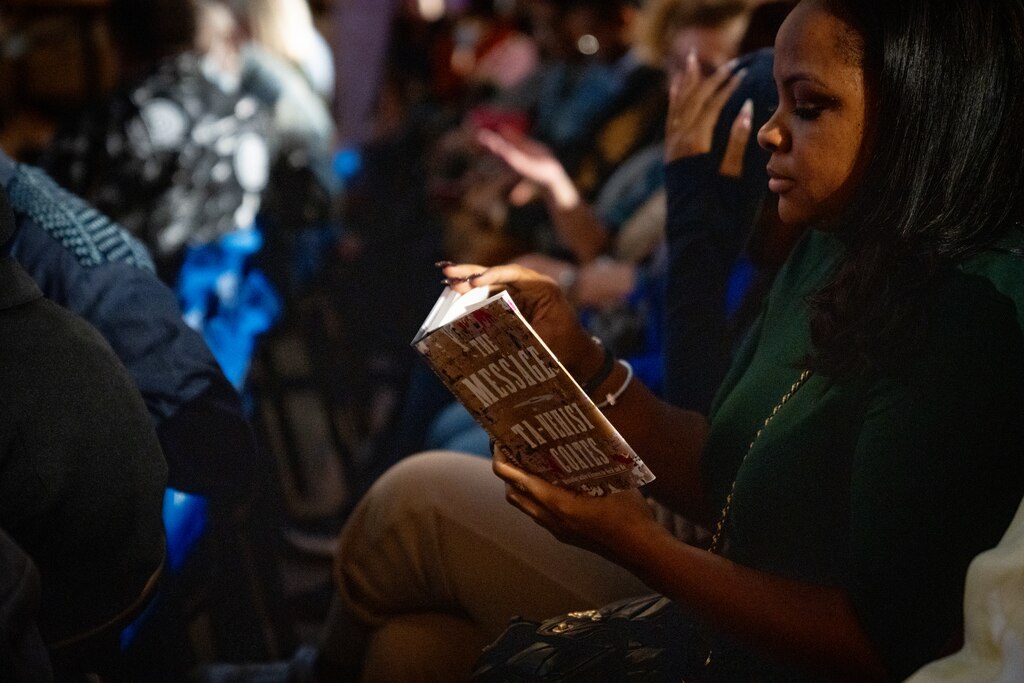Ta-Nehisi Coates came home to Baltimore Wednesday night and was greeted with applause, an ovation and an engaged crowd.
The interview, conducted by WYPR’s Tom Hall as part of the “Brown Lecture Series” at the Enoch Pratt Free Library, touched on Coates’ childhood in Baltimore, the craft of writing, what being a famous author is like and, yes, Palestine.
Since growing up in Baltimore, Coates has written for magazines (and became especially well-known for his blockbuster piece “The Case for Reparations” in The Atlantic), and published collections of essays, novels and comic books.
His appearance was the second stop of his tour for his newest book, “The Message.” The new book was originally supposed to be about writing, Coates said. But as he traveled — to Dakar, Senegal; Columbia, South Carolina; and Palestine — Coates “found himself grappling with deeper questions” about the stories people tell and how they shape and distort reality.
The Baltimore Banner thanks its sponsors. Become one.
Here are three takeaways from the talk and the book.

Coming back home
Coates said he grew up going to the Pratt Library. Once over the summer, he said, he read 24 books as part of a reading challenge — and a library staff member told his father that was far more than any other participating child.
So, when he considers when he first thought he could be a writer one day, “I think back to that moment,” Coates said.
On Wednesday night, on his way to the Enoch Pratt, he said he was giving his wife a “winding narration” of where he grew up as they drove from his mother’s house.
He talked about turning off Liberty Heights and showing his wife “where my Nike hat got snatched.” He talked about going to his local branch of the library all the time. To answer a question from Hall about where he grew up, Coates said it was in the Enoch Pratt Free Library — and that he “couldn’t imagine” his life as a writer without it.
The Baltimore Banner thanks its sponsors. Become one.
When Hall had to wrap up the interview, the home crowd booed — they wanted more time with Coates.

Haunted by Baltimore
In “The Message,” Coates writes about writing as a thing that haunts. He doesn’t just want to “convince” a reader, he wants them to “think about your words before bed, see them manifest in their dreams, [and] tell their partner about them the next morning.”
References to Baltimore, and growing up in Baltimore, are dotted throughout the book. And yes, Coates said, Baltimore haunts his work still today.
“You’re not gonna get another childhood,” he said.
Growing up here affected how he processes things, Coates said.
The Baltimore Banner thanks its sponsors. Become one.
As an example, he talked about a recent contentious interview on “CBS Mornings,” where host Tony Dokoupil pressed Coates, including asking him “What is it that particularly offends you about the existence of a Jewish state, that is a Jewish safe place, and not any of the other states out there?”
At one point, Coates said in Baltimore, “I was like, ‘Oh, this is a fight. This dude is trying to hurt me.’” He recounted that a co-host attempted to step in, but Coates continued the discussion with Dokoupil. You don’t get to swing on me and then try to break it up, the author said, to laughs and applause in the crowd.
“But why do I process it that way?” Coates asked. “Why do I think about it that way? See, that’s Baltimore.”

Advancing the conversation on Palestine
The longest section of Coates’ new book concerns his visit to Palestine and the oppression he witnessed there.
Coates does not write off the Jewish perspective — the essay on Palestine begins with his visit to Yad Vashem The World Holocaust Remembrance Center. He reflects on the “catastrophe” of the Holocaust and writes that he always comes away thinking that “it was worse than I thought, worse than I could ever imagine.”
The Baltimore Banner thanks its sponsors. Become one.
And Wednesday night, Coates acknowledged talking about the ongoing conflict was difficult for many people. He said the “horrors” of Oct. 7, 2023, when Hamas militants attacked Israel, can’t be diminished.
But Coates said he wishes people were also interested in the conditions in Palestine on Oct. 6, and the conditions in Gaza since Israel declared war on Hamas in response to the attack.
To move the conversation forward, Coates said, he should not be the one talking. He said Palestinian people need to have the microphone handed to them and be heard from directly.
“It should be a Palestinian sitting here,” Coates said.




Comments
Welcome to The Banner's subscriber-only commenting community. Please review our community guidelines.